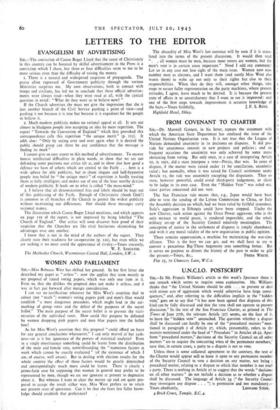LETTERS TO THE EDITOR
EVANGELISM BY ADVERTISING
siR,—The conviction of Canon Roger Lloyd that the cause of Christianity in this country can be fostered by skilful advertisement in the Press is a conviction which I share, but three or four difficulties seem to me to be more serious even than the difficulty of raising the money.
I. There is a natural and widespread suspicion of propaganda. The praise often expressed of Government publicity through the various Ministries surprises me. My own observations, both in contact with troops and civilians, has led me to conclude that these official advertise- ments were always read—when they were read at all, with the cynical question in mind: " What do they want us to believe now? "
If the Church advertises she must not give the impression that she is just another branch of the Civil Service pushing a point of view—and pushing it not because it is true but because it is expedient for the people to believe it.
2. Much modern publicity makes no rational appeal at all. It sets out almost to bludgeon people into accepting an idea by mere repetition. The report " Towards the Conversion of England " which first provoked this correspondence calls this repetition " the unique merit " (p. t is). It adds also: " Only by saying over and over again what it is desired the public should grasp can there be any confidence that the message is finding its mark " I cannot give an easy assent to this method of advertisement. To answer honest intellectual difficulties in plain words, to show that we are not defending some positions our critics tilt at, and to show also how good a defence we have of others which are central to the Faith . . . here is a wide sphere for able publicity, but to chant slogans and half-hypnotise people into belief by " the unique merit " of repetition is hardly treating them as fully intelligent, and makes use of one of the least worthy devices of modern publicity. It leads on to what is called " the mass-mind."
3. I believe that all denominational bias and labels should be kept out of this publicising of the. Faith. Enough of Christianity (thank God!) is common to all branches of the Church to permit the widest publicity without mentioning our differences. Nor should these messages carry sectional names.
The illustration which Canon Roger Lloyd mentions, and which appears on page 119 of the report, is not improved by being labelled " The Church of England." Our critics will soon discover here proof of their suspicion that the Churches are like rival businesses skirmishing for advantages over one another.
I know that is not in the mind of the authors of the report. They clearly state their readiness for co-operation (p. 12o), but even while we are seeking it we must avoid the appearance of rivalry.—Yours sincerely,
W. E. SANGSTER.
The Methodist Church, Westminster Central Hall, London, S.W. z.


























 Previous page
Previous page